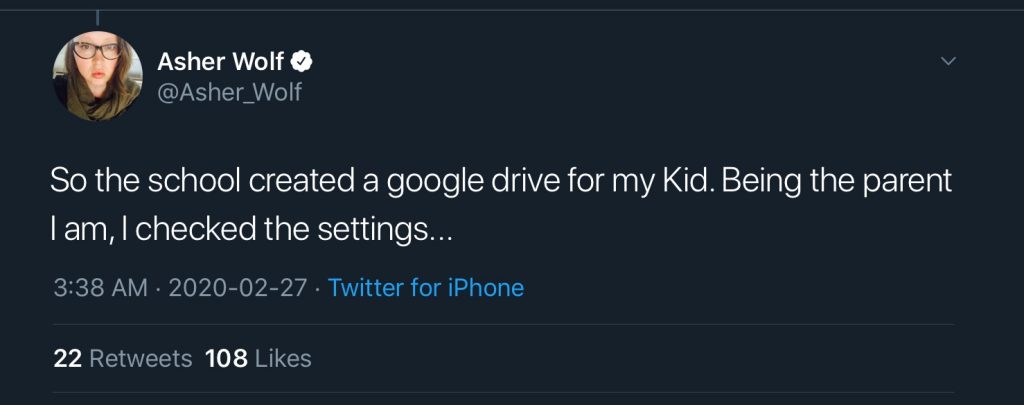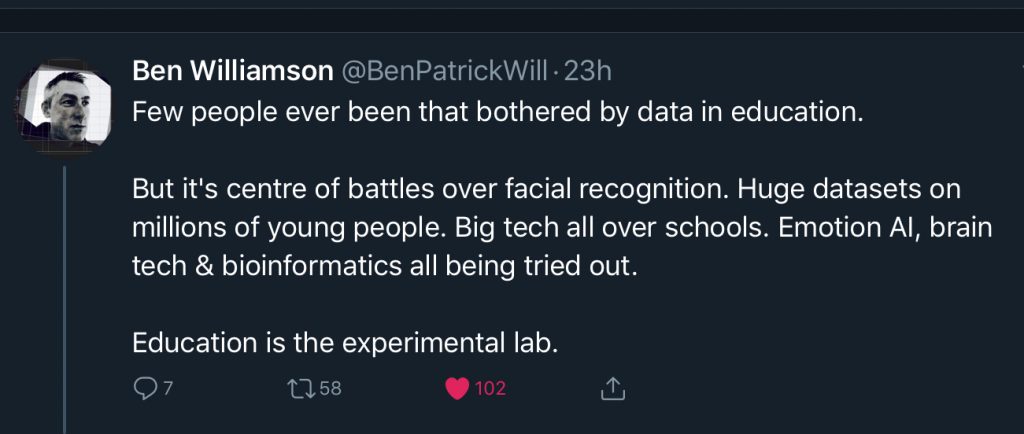Thinking about student data in the classroom.
- The big players and how they monetize student data.
- Turnitin: usin’ all that student intellectual labour to build a machine-learning essay grading tool to put you out of a job.
- Pearson: more student data than anyone in the world, and they’ve already been hacked once (one million students were impacted, and Pearson waited six months to disclose).
- Top Hat: check out a close read of the EULA before you bring it into your classroom.
- And one for faculty… Academia.edu: it’s at least part of how predatory journals find you.
- A lot of people talk about contract cheating, but I think the buried lede is that contract cheating is really a story about data.
- Companies use algorithmic searching to prey upon students in their vulnerable moments.
- Once they access the LMS through one student, they have access to many more.
- After first contact, they extort students by threatening to use their data against them.
What are the concerns from a broader institutional or sector-wide perspective?
- We need to be wary of ed tech hype, and following trends — see Audrey Watters 100 Worst Ed Tech Debacles of the Decade.
- Beware the dangers of vendor lock-in and planned obsolescence.
- Broad impacts on privacy “student data is the new oil.”
- ”It’s certainly very exciting the amount of data we have access to. We know [if] students are showing up to class, do they understand what’s going on in class, are they doing their homework, when are they doing their homework?” — Top Hat CEO Mike Silagadze.
- The LinkedIn Learning business model.
- Google Apps for Education: what we don’t know can’t hurt us, right?
- “My investigation has revealed that Google tracks children across the internet, across devices, in their homes, and well outside the educational sphere, all without obtaining verifiable parental consent. Google has used this access to collect massive quantities of data from young children not to benefit the schools you have contracted with, but to benefit Google’s own commercial interests… While purporting to offer only educational services, Google instead has stripped children and parents of autonomy and control of their most sensitive personal information, forcing children to acquiesce to constant monitoring, in perpetuity, in exchange for their education” — From lawsuit by New Mexico attorney general Hector Balderas.
And sometimes the security promised by a cloud provider is only as strong as its most confused admin…

Ben Williamson, Code Acts in Education.

NOW:
We saw the pandemic become a rationale for the application of what Naomi Klein termed “disaster capitalism” into educational tech and the provision of education in general: exploiting a crisis to establish controversial and questionable practices, while teachers and learning technologists were too distracted (emotionally and cognitively) to fully comprehend, much less to resist effectively.
The GSV EdTech 150 (“the most transformational growth companies in digital learning”) provides a contemporary snapshot of where the learning technology industry is headed, and how it perceives this moment in history, weaponizing and distorting concepts such as “global learning” and “equal access” in the process:
EdTech has experienced an inflection point over the last two years in the wake of Covid. Now, the industry is at a critical and exciting time to leverage this momentum to provide opportunity and education for ALL. Education is truly on the “edge”.
Looking back, it seems obvious that one growing technology that we did not fully see coming was the rise of online proctoring for exams. The pandemic immediately placed this technology front and centre. Beyond the applications of the technology itself, the relationship between vendors and critical learning technologists was starkly represented by the attempt by Proctorio to silence Ian Linkletter (then of UBC) by legal means.
(We organized a virtual teach-in with some of our favourite critical voices: https://againstsurveillance.net/.)
At TRU, the pandemic meant the near-overnight ubquity of MS Teams. Brenna wrote a detailed inquiry into Microsoft in the 2021 Digital Detox, noting the accompanying introduction of pervasive surveillance the possible calculation of “productivity scores”.
Coming soon to MS – the Metaverse! Perhaps we will be redeemed from the scrap pile and reimagine our once-meaningful lives in a digital simulation.
https://www.youtube.com/watch?v=LcmAlpIp3oM
Discussion – from your perspective, what are your concerns? Has the past two years changed your relationship to learning technology.



